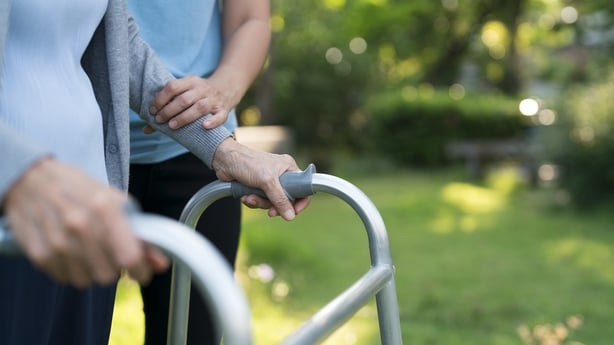The number of nursing home closures have more than doubled nationwide over a four-year period, according to the Health Information and Quality Authority (HIQA).
Its latest overview report, following the inspection and regulation of nursing homes during 2022, shows that since 2019, 50 nursing homes have closed.
This resulted in a rise in the number of beds taken out of the system from 295 in 2019 to 887 last year.
Of the 14 nursing homes that closed in 2022, 12 centres closed voluntarily.
One closed when the registered provider did not renew its registration and another was closed by HIQA's Chief Inspector under the Health Act.
In 2022, nursing home closures resulted in a reduction of 414 beds nationally which required residents in these nursing homes to find an alternative centres.
The number of nursing homes that closed last year was greater than in previous years, excluding 2020 (21 closures) where numbers were impacted by decisions to repurpose some HSE-owned nursing homes during the pandemic.
There were six nursing home closures in 2019, equating to 145 beds; 2020 saw a sharp rise when 21 nursing homes closed due to the pandemic. That year saw 764 beds removed from the system.
In 2021, nine nursing homes closed with 189 beds between them and last year saw the closure of 14 nursing homes with 414 beds.
Nursing home providers cited a number of reasons for the closures, such as concerns about financial viability, staffing difficulties, burnout after two years of coping with the Covid-19 pandemic and a recognition that operating a nursing home was not an attractive career proposition for the next generation.

The report says that the vast majority of providers followed the requirements of the regulations, and managed the winding down of their nursing home over a six-month period, allowing residents and their families time to identify suitable new accommodation.
However, in November 2022, HIQA's Chief Inspector had to issue a regulatory notice in response to concerns that a small number of providers were not complying with their statutory obligations under the Health Act in terms of the notice period for closure.
This resulted in residents and their families, in some cases, being given very little notice of the provider's intention to close and as a consequence were rushed to find alternative accommodation according to the report.
The report also notes that the Government also "took action" to protect the rights of residents living in nursing homes by preventing any building which was registered by the Chief Inspector as a designated centre for older people in September 2022, from being considered as a centre to accommodate refugees for two years following removal from HIQA's register.
This was later revised to 18 months following notification of closure to the Chief Inspector.
The report highlights that the majority of registered providers making the decision to close are smaller nursing homes. The 14 centres that closed in 2022 offered fewer than 50 beds.
Many of the centres were located in or close to communities employing local staff and had operated over many years.
The impact for residents when their home closes is significant according to HIQA, because many would have made the decision to move to that particular nursing home due to being close to family, friends, and liking the service provided.
It has also noted that the majority of nursing homes that closed, had a good level of compliance with HIQA regulations.
The report acknowledges that the nursing home sector is changing and that the size of nursing homes are increasing.
Many existing nursing homes are building additional units, and new-build nursing homes generally provide 90 or more beds.
Data included in the report shows that there is a trend of new beds being provided in the east of the country, but many other areas are seeing an overall reduction, especially in rural areas.
"The move to smaller numbers of owners, providing more nursing homes also continues," it said.
"The impact of these changes in the sector should be considered as the Department of Health continues the process of reviewing the regulations."

'Very worrying report'
The chief executive of Nursing Homes Ireland Tadhg Daly says the HIQA report published today lays bare the state's failure to address the crisis in nursing home care.
He said the rate of nursing home closures is having a huge impact on older people.
"Many of those residents had to leave their families their home and leave their community," Mr Daly said.
"So it is a very, very worrying report, but it confirms what we have been saying in Nursing Homes Ireland, and indeed many stakeholders over the last number of years."
He says costs are the key issue: "There was this discriminatory funding regime in place under the Nursing Home Support Scheme and the Fair Deal and ultimately, yes, staff costs are rising.
"Obviously, energy in the last number of years has been rising, and the State Fair Deal scheme hasn't kept pace with those inflationary costs."
He says the HIQA report should now be a call to arms to government to take action and restore confidence in the sector.
"Older people watching this will be worried about their own nursing care," he said.
Mr Daly said the appropriate number of beds are needed in the right locations across the country.






